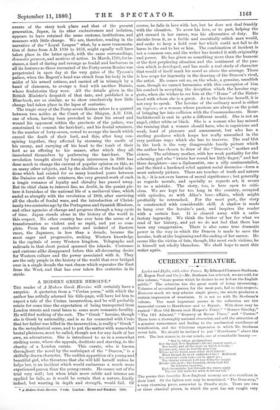A MODERN GREEK HEROINE.*
Tin reader of A Modern Greek Heroine will certainly have a surprise. A quotation from a " Cretan poem," with which the author has artfully adorned his title-page, will have led him to expect a tale of the Cretan insurrection, and he will probably retain for some time the expectation of being transported from London streets and rural lanes to some more romantic locality. He will find nothing of the sort. The " Greek " heroine, though she is Greek by nationality, and is so far connected with Crete that her father was killed in the insurrection, is really a " Greek " in the metaphorical sense, and to put the matter with somewhat brutal plainness, mast be called, though not for any fault of her own, an adventuress. She is introduced to us in a somewhat striking scene, where she appeals, destitute and starving, to the charity of a London curate. This curate, who is known throughout the novel by the soubriquet of the " Deacon," is a skilfully-drawn character. The sudden apparition of a young and beautiful girl, who threatens that she will kill herself unless he helps her, is an incident which would embarrass a much more experienced person than the young curate. He comes out of the trial very well; but when trials more subtle and intense are applied he fails, as it would be certain that a nature, kindly indeed, but wanting in depth and strength, would fail. Of • s Modern Greek Heroine. 3 vols. London : Hurst and Blackett. 1880. course, he falls in love with her, but he does not deal frankly with the situation. To avow his love, or to part, helping the girl onward in her career, was his alternative of duty. Ho shrinks from it, as a feeble and essentially selfish man would, and seeks to keep a hold over her which could not fail to do harm in the end to her or him. The combination of incident is not a common one, and the writer has treated it with originality and power. He has given us something more than the humour of the first perplexing situation and the sentiment of the pas- sion which is developed, and has made a real study of character that would of itself mark his novel as above the average. There is less scope for ingenuity in the drawing of the Deacon's rival, the artist. He comes out as, on the whole, a genuine, unselfish man, though we cannot harmonise with this conception of him his conduct in accepting the deception which the heroine sug- gests, when she wishes to see him at the " Home " of the Sister- hood with whom she is a guest. As to the heroine herself, it is not easy to speak. The heroine of the ordinary novel is either an ingenue, or a woman whose passions are always on the point of bringing her into collision with the Commandments. Boar- bachkiazouli is cast in quite a different mould. She is not an angel, either white or black. She is a woman who has missed the training that a woman should have, who is capricious and weak, fond of pleasure and amusement, but who has a sterling goodness which keeps her really unscathed in the very perilous ways which she has to traverse. The real blot in the book is the very disagreeable family picture which the author has chosen to draw of the " Deacon's " mother and sisters. The arbitrary mother, with her weak partiality for the scheming girl who " twists her round her little finger," and her three daughters—one a diplomatist, one a silly sentimentalist, and the third a hardened rebel against social decencies—form a most unlovely picture. There are touches of truth and nature in it,--it is not even barren of moral significance ; but generally as regards morals, and specially as regards art, it seems to us a mistake. The story, too, is here open to criti- cism. We are kept far too long in the country, occupied with episodes, as with Alice's love - affairs, which might profitably be retrenched. For the most part, the story is constructed with considerable skill. A shadow is made to hang over the heroine's past, and inspires the reader with a certain fear. It is cleared away with a satis- factory ingenuity. We think the better of her for what we read of her history, and yet we do not feel that there has been any exaggeration. There is also some true dramatic power in the way in which the Deacon is made to save the heroine, both at the beginning and the ending of her career. Ho seems like the victim of fate, though, like most such victims, he is himself not wholly blameless. We shall hope to meet this writer again.


































 Previous page
Previous page